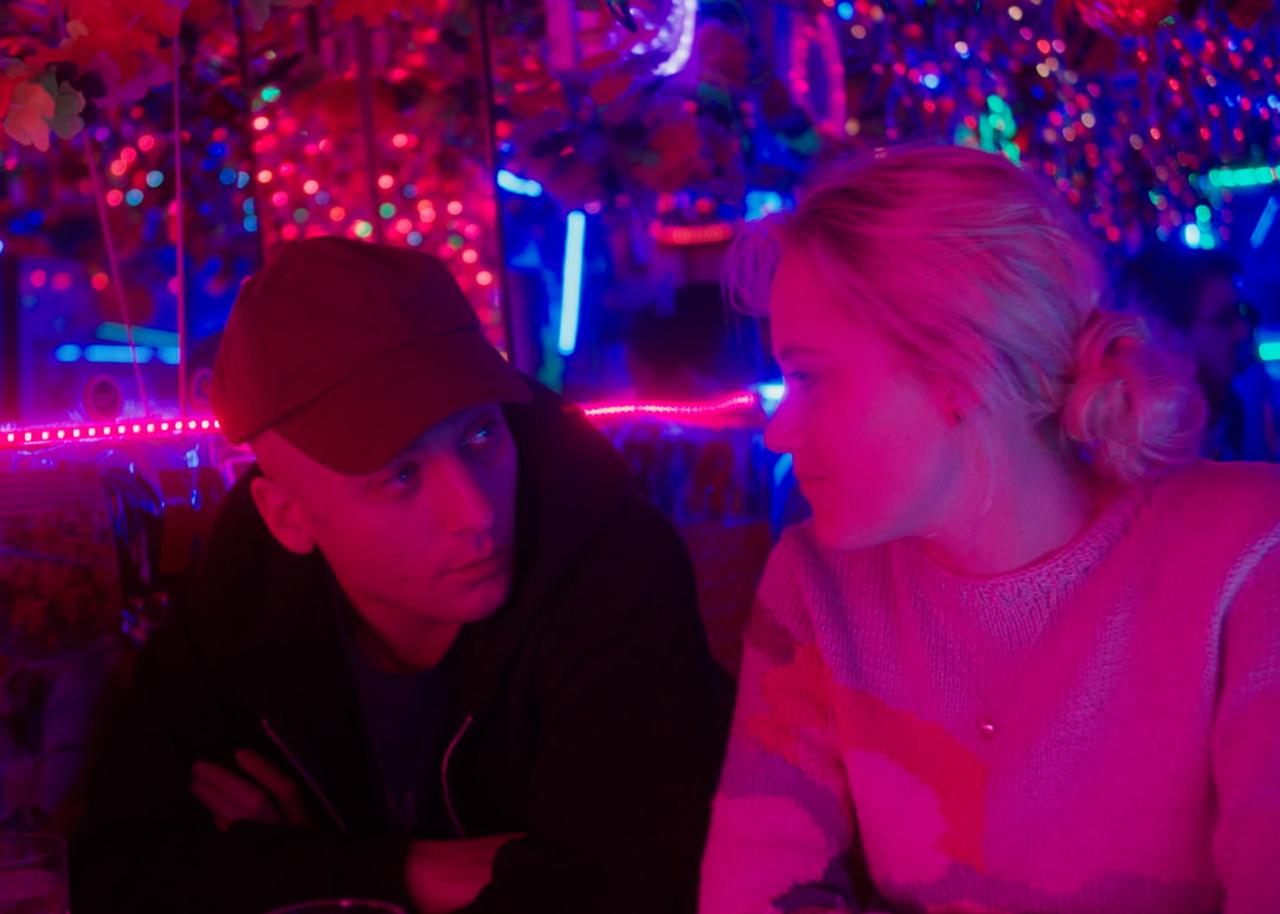In the burn bright and fade away world of memes, you might have forgotten all about the sizeable backlash spawned a couple years back by The Modern Man article, “How To Talk To A Woman Wearing Headphones.” The step-by-step pickup guide quickly earned derision for its assumption that a woman wearing headphones is single, straight, and just waiting around for a random dude to validate her attractiveness and ask her out on a date. So, it’s a bit strange that in writing/directing team Hannah Marks’ and Joey Power’s “After Everything” the meet-cute that’s supposed to form the foundation of the romance that drives the rest of the picture essentially plays out that scenario. It’s the first step in an on-screen relationship that’s presented as charmingly dysfunctional, but by all indications is wildly imbalanced at best and toxic at worst.
The party-hearty, tech entrepreneur dreaming Elliot (Jeremy Allen White) is the young man who interrupts Mia’s (Maika Monroe) podcast while she’s waiting for the train at a subway station. Recognizing her as the woman who comes in to get a ham sandwich from the coffee shop where he works, he persists through her multiple signals that she’s not interested to ask for her number. The somewhat mousy Mia is initially reluctant but charmed enough to leave her number for Elliot at his work. However, for all the unearned confidence Elliot swings around, he has a secret: he’s been diagnosed with Ewing Sarcoma, a rare form of bone cancer.
Despite living with this best friend Nico (DeRon Horton), who you’d assume Elliot would turn to, or perhaps telling his loving parents (Callie Thorne and Bill Sage) about this devastating news, Mia becomes Elliot’s shoulder to cry on, and the first person to learn of his diagnosis. Blessed with a staggeringly deep well of human decency, Mia immediately becomes Elliot’s support, even as she’s just getting to know him, and willingly goes so far as to break the news to his mother and father — after meeting them for the first time — because he can’t get the words out. Naturally, Mia and Elliot fall in love during this emotionally intense period, but this relationship, presented as mutually loving, and solidified by a rare and special bond between two people who have thrown off the shackles of convention to be with each other, is far from healthy.
The script’s failing is that Mia is presented as readily self-sacrificing, but we see little to understand the depth of her attraction to Elliot that would spark such a willingness to go down this path. It’s certainly more than just pity, but if Mia has struggles in maintaining a strong front for Elliot, while grappling with a new relationship that may have a tragic end, they are rarely voiced to anyone around her. Even her two roommates (a woefully underutilized Sasha Lane and Olivia Luccardi) that might, in a better screenplay, lend an ear and some advice, are relegated to ineffective comic relief. Meanwhile, from frame to frame, Elliot goes from sick to sour, a man so wrapped up in being cared for, and living with the identity of being cancer patient, he doesn’t see the mountains being moved for him by Mia. This is supposed to be counterbalanced by the genuine love he feels for his partner, but since it’s difficult to understand why Mia wants to be with him in the first place, Elliot’s journey is difficult to sympathize with.
Late in the picture, Marks and Power eventually thread the storyline toward a bittersweet and wholly believable conclusion, with kind of nuance and complexity that would’ve served the rest of the film far better than the handful of montage sequences scattered throughout. However, it does little to redeem a story that starts with the expectation that a young woman would halt her life to care for a charismatic dude she just met. That’s not to say she wouldn’t be sympathetic or attracted to the situation or potential partner, but “After Everything” takes far too much for granted, while simultaneously following the impulses of its characters that are given little explanation beyond being spurred by the naiveté of youth.
It’s inevitable that in any discussion of “After Everything,” the similarly themed “The Big Sick” would come up. Both indie movies follow a similar structural trajectory, but the big difference is that Kumail Nanjiani and Emily V. Gordon penned picture earns its emotional stripes. Perhaps the comparison is slightly unfair, given that “The Big Sick” was based on their own actual experiences, but its conflicts and complications are detailed and feel authentic. “After Everything” surrounds Elliot and Mia with an array of supporting characters, but almost few who add dimension or insight into their motivations. The young couple exists in a bubble of love that has an air of reality sucked right out of it. [C]





